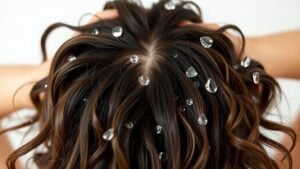Oily hair and ears often result from overactive sebaceous glands, which produce too much sebum. Hormonal changes, stress, or genetics can trigger excess oil, leaving hair greasy and limp. An irritated scalp or harsh hair products may worsen the problem, while humidity and pollution add to the buildup. Some people notice oilier ears due to similar gland activity. Fortunately, simple home remedies can help rebalance oil production without stripping natural moisture. Finding the right solution starts with comprehension of what’s happening beneath the surface.
Causes of Oily Hair and Oily Ears
Oily hair and oily ears frequently occur as the skin’s sebaceous glands generate an excessive amount of sebum, a natural oil that maintains hair and skin hydrated. Whenever these glands become overactive, they produce too much oil, leading to greasy hair and shiny ears.
Hormonal imbalances, often triggered by puberty, stress, or medical conditions, can ramp up sebum production. An irritated scalp, caused by harsh products or frequent washing, might also worsen oiliness as the skin tries to compensate. Genetics play a role too—some people naturally have oilier skin.
Environmental factors like humidity or pollution can adhere to the scalp, making hair feel heavier. Although oily hair isn’t harmful, it can feel uncomfortable and look limp if not managed properly.
Apple Cider Vinegar Rinse for Oil Control
- Mix 1-2 tablespoons of apple cider vinegar with a cup of water to avoid irritation.
- Apply after shampooing, massaging it into the scalp to dissolve excess sebum.
- Rinse thoroughly after 1-2 minutes to prevent residue.
This simple remedy clarifies the scalp while adding shine. Over time, it reduces overactive oil glands, making hair feel fresher longer. For best results, use once or twice weekly.
Aloe Vera Treatment to Balance Sebum Production
Ever marveled how aloe vera’s soothing properties could help manage excess oil? Aloe vera benefits extend beyond skin care, offering natural aloe vera oil control for greasy hair. Its enzymes dismantle sebum, the oily substance produced by scalp glands, without stripping moisture.
Applying fresh aloe gel directly to the scalp balances oil production, reducing that slick, heavy feeling. The plant’s anti-inflammatory properties also calm irritation, which can sometimes trigger excess oil. For best results, leave the gel on for 15 minutes before rinsing with cool water.
Regular use helps maintain a healthy scalp, preventing accumulation that leads to greasy strands. Unlike harsh products, aloe vera works gently, making it ideal for those with sensitive skin or frequent oiliness.
Lemon Juice Solution for Greasy Hair
Lemon juice can help manage greasy hair through balancing scalp oil production due to its natural astringent properties. Mixing fresh lemon juice with water and applying it to the scalp could reduce excess sebum without stripping moisture.
Proper rinsing and occasional use prevent dryness while keeping hair fresh and lightweight.
Lemon Juice Benefits
- Balances pH: Lemon juice’s acidity neutralizes excess oil, leaving hair invigorated.
- Cleanses deeply: Dissolves buildup from products or sweat, unclogging pores.
- Adds shine: Lightens dullness caused by grease, enhancing natural luster.
The vitamin C in lemon also strengthens strands, reducing breakage. Unlike harsh chemicals, it’s a mild solution for oily scalps, though those with sensitive skin should dilute it. Its stimulating scent adds a subtle perk, making it a multitasking remedy.
For best results, pair it with other natural ingredients to avoid dryness.
Application Method Tips
Applying lemon juice to greasy hair requires a careful approach to avoid irritation while optimizing its benefits. For targeted application, dilute fresh lemon juice with equal parts water to reduce acidity. Using a spray bottle helps achieve even distribution, focusing on the roots where oil buildup is worst.
Gently massage the solution into the scalp, avoiding aggressive rubbing to prevent dryness. Leave it on for 5-10 minutes before rinsing with cool water to seal hair cuticles. Overuse can strip natural oils, so limit treatments to twice weekly. Those with sensitive skin should test first.
Combining lemon juice with aloe vera or honey adds moisture, balancing its clarifying effects. Proper application guarantees greasy hair stays fresh without discomfort.
Baking Soda Scrub to Absorb Excess Oil
Baking soda works as a natural oil absorber, helping to reduce greasiness without harsh chemicals. Its fine texture gently exfoliates the scalp, removing buildup that can clog pores.
This simple scrub balances oil production while keeping the scalp clean and refreshed.
Natural Oil Absorption
- Neutralizes pH: Baking soda’s alkaline nature counteracts scalp acidity, reducing overactive oil production.
- Lifts Residue: Its fine granules gently elevate away excess sebum and product buildup, leaving hair fresher.
- Restores Balance: Through absorbing oil, it prevents clogged follicles, fostering healthier hair over time.
For optimal outcomes, combine a teaspoon of baking soda with water to create a paste, massage into damp hair, then rinse completely. This technique suits infrequent use, as overdoing it could dry the scalp. Those with sensitive skin should conduct a patch-test initially.
Gentle Scalp Exfoliation
Excess oil on the scalp can make hair look greasy and feel heavy, but a gentle baking soda scrub offers a simple fix. This natural remedy works through absorbing sebum and removing dead skin cells, balancing oil production without harsh chemicals.
To use it, mix a tablespoon of baking soda with water to form a paste, then massage it into the scalp using gentle exfoliation techniques. Leave it for a few minutes before rinsing thoroughly. This deep cleansing routine helps unclog hair follicles, preventing buildup that leads to oily hair. However, overuse can dry out the scalp, so limit it to once a week.
For extra soothing effects, add a few drops of tea tree oil. This method keeps hair fresh and light while maintaining scalp health.
Tea Tree Oil for Scalp Health and Oil Reduction
- Deep Cleansing: Tea tree oil penetrates hair follicles, dissolving excess oil and buildup.
- Soothing Relief: Its anti-inflammatory traits calm irritation, reducing redness and itchiness.
- Freshness Boost: A few drops mixed with shampoo leave hair feeling lightweight and refreshed.
For best results, dilute tea tree oil with a carrier oil like jojoba to avoid irritation. Regular use can transform an oily scalp into a balanced, healthier environment. This natural remedy offers a simple yet effective solution for those seeking clarity in their hair care routine.
Clay Mask to Detoxify and Refresh Hair
Since oily hair can leave it feeling heavy and dull, a clay mask offers a natural way to detoxify and refresh the scalp. Bentonite or kaolin clay absorbs excess oil while providing deep pore cleansing, removing buildup without stripping moisture. The mask’s natural detoxification properties help balance sebum production, reducing greasiness over time.
To use, mix clay with water or apple cider vinegar into a paste, apply to damp hair, and leave for 10–15 minutes before rinsing. This treatment can soothe irritation and unclog follicles, promoting healthier hair growth. For optimal results, use once weekly, adjusting frequency based on scalp needs. Those with sensitive skin should patch-test first. Regular use restores shine and lightness, making hair feel revitalized.
Conclusion
Like a garden needing balance, oily hair and ears flourish as sebum runs wild. But nature offers fixes—vinegar’s sharp reset, aloe’s gentle touch, or clay’s deep cleanse—each taming the tide. With time, these remedies don’t just mask the shine; they teach skin and scalp to find harmony. The greasy struggle fades, leaving hair fresh and confidence lighter, like a breeze through untangled strands.




